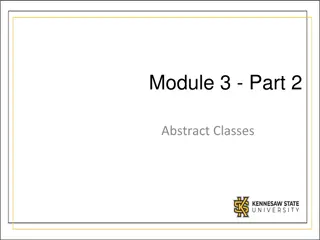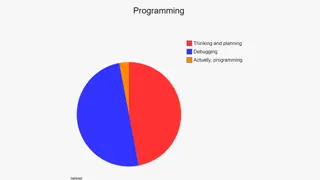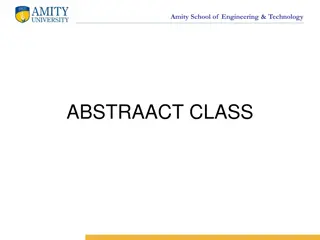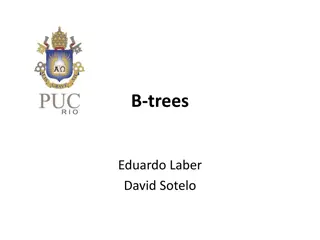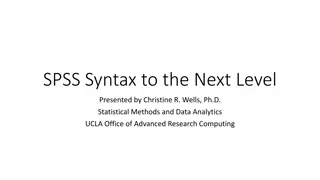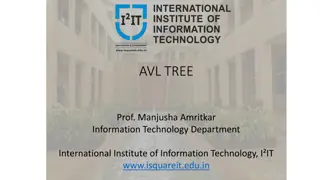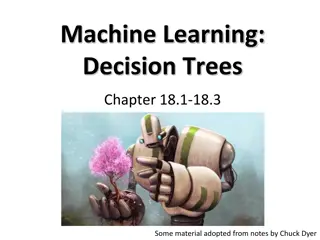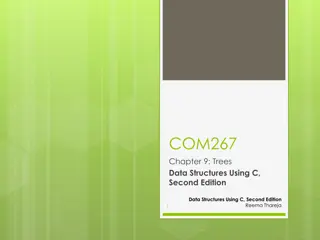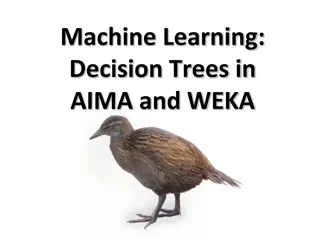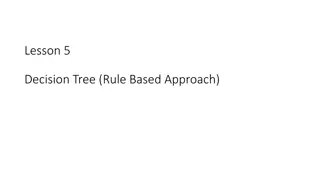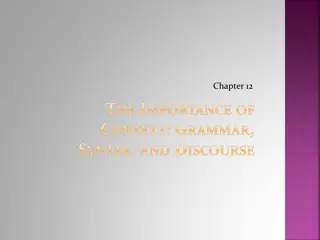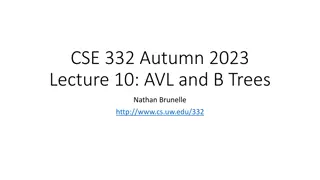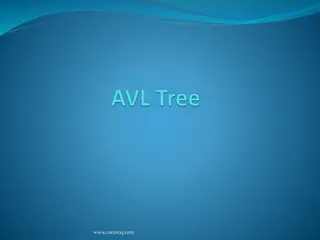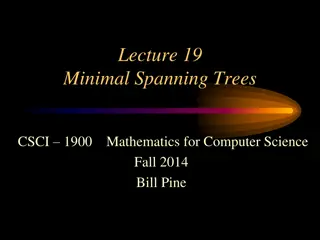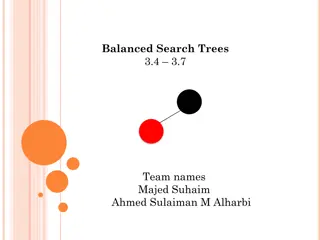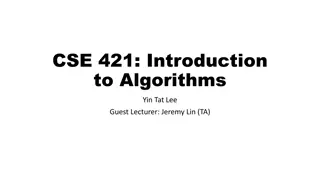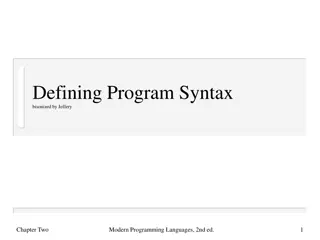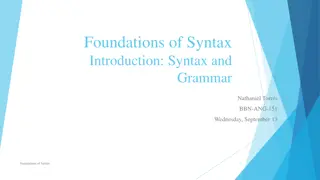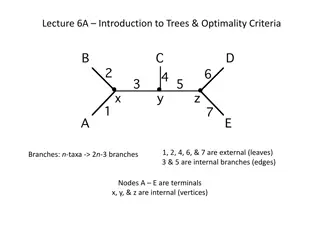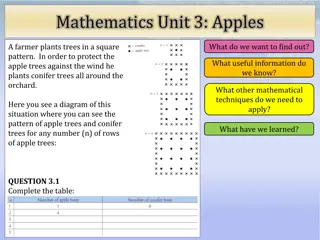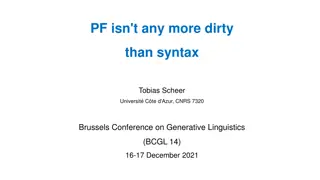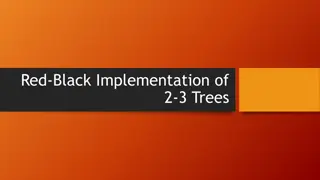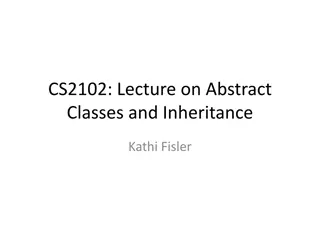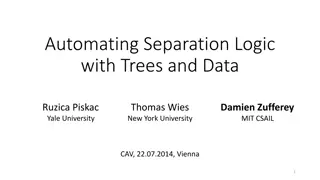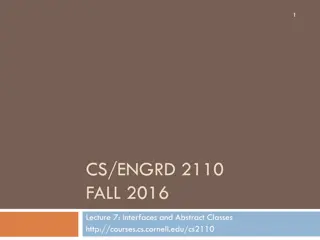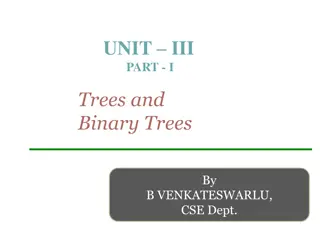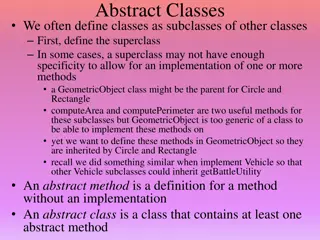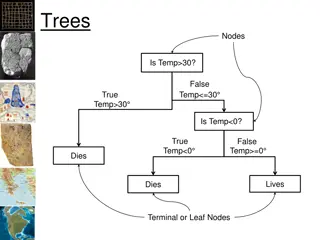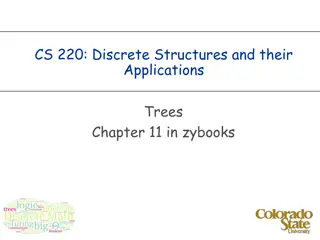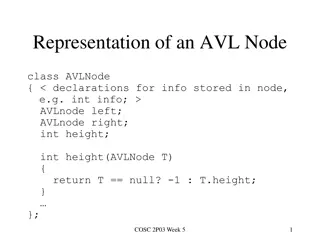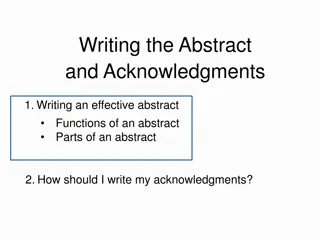Understanding Abstract Classes and Inheritance in Object-Oriented Programming
Inheritance in object-oriented programming allows for reusing proven and debugged high-quality software through abstract classes. Abstract classes serve as superclasses and cannot be instantiated, instead, they force child classes to implement specific methods. Concrete and abstract methods can coex
5 views • 15 slides
Monumental Trees of Italy - A Natural Legacy of Grandeur and Cultural Significance
Italy boasts a rich heritage of monumental trees, defying the challenges of nature and human exploitation to grow into majestic and culturally significant specimens. These grand trees symbolize the enduring bond between nature and humanity, embodying naturalistic, aesthetic, and historical values. T
7 views • 23 slides
Understanding Language Syntax Through Syntax Trees
Explore how both programming languages and spoken languages can be parsed into syntax trees, revealing the syntactic structure of sentences. Learn about terminals and non-terminals in syntax trees and how they represent different components of language. Dive into syntax tree abstraction for a deeper
2 views • 32 slides
Understanding Abstract Classes in C++ and Java
Abstract classes play a crucial role in C++ and Java programming. In C++, a class with at least one pure virtual function becomes abstract, while in Java, the 'abstract' keyword is used to define an abstract class. This article discusses the concept of abstract classes, their key characteristics, ex
0 views • 33 slides
Understanding B-Trees: Efficient Data Storage and Retrieval
B-Trees are balanced search trees designed for secondary storage devices, commonly used by databases. They can have many children, allowing for efficient data organization. The branching factor of B-Trees keeps their height low, making them ideal for minimizing disk I/O operations. This article expl
1 views • 76 slides
Mastering SPSS Syntax for Advanced Data Analysis
Delve into the world of SPSS syntax with this workshop by Christine R. Wells, Ph.D., where you will learn to efficiently work with SPSS commands and subcommands, understand when commands execute, and optimize your data analysis process. Discover insider tips on setting options, using SPSS version 28
2 views • 141 slides
Understanding AVL Trees: A Self-balancing Binary Search Tree
AVL trees, named after their inventors Adelson-Velski & Landis, are self-balancing binary search trees where the height difference between left and right subtrees is limited. This ensures a balanced factor of -1, 0, or 1, leading to efficient operations such as insertion and deletion. Rotation techn
2 views • 21 slides
Understanding Decision Trees in Machine Learning
Decision trees are a popular supervised learning method used for classification and regression tasks. They involve learning a model from training data to predict a value based on other attributes. Decision trees provide a simple and interpretable model that can be visualized and applied effectively.
1 views • 38 slides
Exploring Trees Data Structures Using C - Second Edition
Learn about trees data structures in the context of programming using the C language. This comprehensive guide covers topics such as types of trees, tree creation, traversal, basic terminologies, and different tree structures like binary trees and binary search trees. Dive into the world of trees da
0 views • 54 slides
Understanding Interfaces and Abstract Classes in Java
Interfaces and abstract classes play a crucial role in Java programming by defining contracts and blueprints for classes to implement. Interfaces provide a way for classes to declare their capabilities, while abstract classes allow for partial implementation. This article explains the concepts of in
0 views • 19 slides
Understanding Decision Trees in Machine Learning with AIMA and WEKA
Decision trees are an essential concept in machine learning, enabling efficient data classification. The provided content discusses decision trees in the context of the AIMA and WEKA libraries, showcasing how to build and train decision tree models using Python. Through a dataset from the UCI Machin
3 views • 19 slides
Understanding Decision Trees: A Visual Guide
Explore the concept of Decision Trees through a rule-based approach. Learn how to predict outcomes based on a set of rules and visualize the rule sets as trees. Discover different types of Decision Trees and understand which features to use for breaking datasets effectively.
0 views • 28 slides
Understanding Mathematics Through Concrete Pictorial Abstract Approach
Utilizing the Concrete Pictorial Abstract (CPA) method in teaching mathematics can help children grasp abstract concepts by starting with concrete objects, moving to pictorial representations, and then to abstract symbols. This approach aids in building a strong foundation in math, making it easier
0 views • 18 slides
Understanding Grammar, Syntax, and Discourse in Biblical Texts
Explore the significance of context in analyzing grammar, syntax, and discourse in biblical Greek and Hebrew texts. Learn about the foundational elements, word order, Greek syntax basics, and the importance of discourse analysis. Delve into the definitions of grammar, syntax, and discourse, and unde
1 views • 30 slides
Abstract Domains for Lists and Heap Structures: A Comprehensive Overview
Explore the concepts of quantified data automata on skinny trees, automatic shapes in static analysis, universally quantified properties on lists, heap configurations with skinny trees, and the extension of quantified data automata over lists. Dive into the abstract domain of automata to capture inf
1 views • 20 slides
Understanding Priority Queues and B-Trees in Data Structures
Explore the concepts of priority queues and B-Trees, including rigorous problem-solving in homework assignments. Discover the key elements of B-Trees, their implementation, and benefits. Gain insights into memory architecture considerations and the importance of properly aligning nodes. Learn about
0 views • 82 slides
Understanding AVL and B-Trees in CSE 332 Autumn 2023
AVL trees are self-balancing binary search trees that ensure the heights of left and right subtrees differ by at most one, maintaining balance during insertions and deletions through rotations. This lecture delves into AVL trees, their implementation, balancing techniques, and examples, along with i
0 views • 35 slides
Understanding Red-Black Trees for Balanced Search Structures
Red-black trees are balanced binary search trees ensuring a maximum height of O(log n). They maintain balance properties by coloring nodes red or black, with operations such as search, insertion, deletion efficiently managed in O(log n) time. Red-black trees exhibit guaranteed height bounds for impr
0 views • 26 slides
Understanding Height-Balanced Binary Trees and AVL Trees
The efficiency of tree operations like searching, insertion, and deletion is closely tied to the tree's height. Maintaining a balanced height in trees, such as AVL trees, ensures O(log2n) complexity for efficient operations. Learn about height-balanced binary trees, how to check if a tree is balance
0 views • 27 slides
Understanding Red-Black Trees and BST Properties
Red-black trees are balanced BSTs with specific properties like color rules and black node count. They ensure O(logn) height for balanced trees. Learn about the characteristics, insertion methods, and rotations in red-black trees compared to BSTs.
0 views • 44 slides
Understanding Minimal Spanning Trees in Graph Theory
Dive into the concept of minimal spanning trees in graph theory with a focus on algorithms like Prim's and Kruskal's. Explore the definition of trees, spanning trees, and weighted graphs. Learn about the importance of finding the minimal spanning tree in a graph and how it contributes to optimizatio
0 views • 16 slides
Understanding Balanced Search Trees and Red-Black Trees
Balanced Search Trees ensure efficient data retrieval by maintaining balancedness properties within the tree structure. Red-Black Trees are a type of binary search tree with specific coloring rules that help in balancing and efficient searching. Learn about the structure, properties, and worst-case
0 views • 75 slides
Understanding Spanning Trees and Minimum Spanning Trees
Explore the concept of spanning trees and minimum spanning trees in graph theory through an in-depth lecture outline covering topics like Cut Property, Cycle Property, Kruskal's Algorithm, and more. Delve into the significance of Minimum Spanning Trees (MSTs) as the lowest-cost spanning tree of a gr
0 views • 41 slides
Understanding Programming Language Syntax
This content delves into the fundamental aspects of programming language syntax, covering lexical analysis, syntax rules, and semantics. It also explores how grammar works by building parse trees, providing examples from English grammar and programming languages. The use of Backus-Naur Form (BNF) an
0 views • 43 slides
Understanding the Foundations of Syntax in Language
Delve into the basics of syntax and grammar, exploring the essence of language, syntax rules, morphemes, and morphemic decomposition. Discover how syntax shapes meaningful communication and learn to identify morphemes in English words.
0 views • 17 slides
Understanding Trees and Optimality Criteria
In this lecture, you will delve into the world of trees and optimality criteria. Explore concepts like external and internal branches, terminal nodes, and vertices. Discover the Newick format for tree representation, the rooting of trees, and free rotations around nodes. Dive into the growth of tree
0 views • 15 slides
Solving the Apple Tree and Conifer Tree Pattern Puzzle
In this mathematics unit, we explore a scenario where a farmer plants trees in a square pattern, with conifer trees surrounding the apple trees for protection against the wind. The task involves completing a table to understand the pattern for different numbers of rows of apple trees. Through this e
0 views • 15 slides
Minimalist Approach to Syntax and Phonology in Linguistics
The discussion delves into the relationship between syntax and phonology in linguistics, emphasizing the minimalist approach that aims to create a clean syntax while considering phonology as an ancillary element. It explores the idea that syntax is central to grammar, while phonology is considered '
0 views • 40 slides
Implementation of Red-Black Trees in 2-3 Trees
Implementation of Red-Black Trees within the structure of 2-3 Trees involves representing 3-nodes using red links, maintaining specific restrictions on representation, ensuring perfect black balance, and establishing a correspondence between red-black BSTs and 2-3 trees. Observations include the col
1 views • 8 slides
Understanding Abstract Classes and Inheritance in Java
Explore how to utilize abstract classes and inheritance in Java programming to share common code across classes. Learn through examples involving animals like Dillo and Boa, and discover the concept of creating helper methods and abstract classes to abstract common features efficiently.
0 views • 31 slides
Automating Separation Logic with Trees and Data
This content discusses the automation of separation logic using trees and data, focusing on extracting the maximum element in a Binary Search Tree (BST). It covers the motivation behind the procedure for extracting the max element, memory safety considerations, functional correctness, and preserving
0 views • 38 slides
Understanding Interfaces and Abstract Classes in CS/ENGRD.2110.FALL.2016
This content covers the concepts of interfaces and abstract classes in a computer science/engineering lecture, discussing the implementation of shapes, method overriding, and the role of abstract classes in preventing instantiation. Various challenges and solutions related to abstract classes and me
0 views • 26 slides
Understanding Trees and Binary Trees in Computer Science
Trees are a fundamental data structure in computer science, modeling hierarchical relationships between elements. This content covers tree terminology, properties, and abstract data type, providing insights into their representation and usage in various applications like organization charts, file sy
0 views • 35 slides
All About Sumac Trees: Features, Uses, and Care Tips
Sumac trees, known for their shrubs and small trees with clusters of reddish drupes, are commonly found in North America and Africa. These trees, comprising approximately 250 species, are used for landscaping but some species can cause skin irritation. With minimal care requirements, sumac trees can
0 views • 11 slides
Understanding Abstract Classes in Object-Oriented Programming
Abstract classes serve as blueprints for subclasses in object-oriented programming, allowing for shared functionality while ensuring specific methods are implemented in subclasses. By defining abstract methods and classes, programmers create a foundation for inheritance, polymorphism, and structured
0 views • 25 slides
Understanding Classification and Regression Trees
Classification and Regression Trees are powerful tools used in data analysis to predict outcomes based on input variables. They are versatile, easy to interpret, and can handle both categorical and continuous predictors. Different types of trees, such as Regression Trees, Boosted Trees, and Random F
0 views • 16 slides
Understanding Unrooted Trees in Phylogenetics
Explore the concept of unrooted trees in phylogenetics, including Newick strings, induced quartet trees, and representations. Learn about the importance of drawing rooted and unrooted trees, as well as understanding the relationship between unrooted trees and binary rooted evolutionary trees.
0 views • 63 slides
Understanding Trees in Discrete Structures
Discrete Structures and Their Applications Trees Chapter discusses the properties and theorems related to trees in graph theory. Trees are defined as connected, undirected graphs with no cycles. The content covers the characteristics of leaves, internal vertices, and the relationship between the num
2 views • 28 slides
Data Structure Concepts: AVL Trees and B-Trees
The content covers important concepts related to AVL trees and B-trees, including the representation of an AVL node, insertion operations, rotations for balancing, and definitions of B-trees. AVL trees are self-balancing binary search trees used to maintain balance during insertions and deletions, w
0 views • 14 slides
Mastering Abstract Writing for Effective Research Communication
Learn the essential functions and parts of an abstract, including how to craft a clear and compelling abstract to attract readers to your full article. Explore tips on orienting readers, structuring content, and avoiding common pitfalls in abstract writing.
0 views • 20 slides
